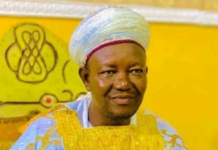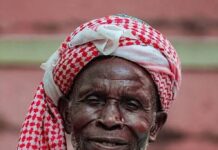A prince in Zazzau emirate and a royalty in the Sokoto Caliphate, who lived without a title but the grand commander of the order of the Niger (GCON); Alhaji Gidado Idris. He was once described by a journalist as the “numero uno” of Abacha’s military government, when he served as Secretary to the Government of the Federation between 1995-1999.
He is among the longest serving public servants in Nigeria, his career panned for full five decades, and in them, he served meritoriously before his retirement in 1999.
Before his prominence, He was among the closest confidants of Sir Ahmadu Bello (Sardaunan Sokoto) the premier of the defunct northern region, whose mentorship cemented his skills and ingenuity.
Since then, Gidado remained in the corridors of power, and has been a key player in the Nigerian project.
Humble, gentle, soft spoken, and meticulous. He was a family man, a lover of sport, a philanthropist, and an elder statesman.
Sokoto.
A son to Malam Idi, Maajin Kaciya, he was born on the 15th of April 1935 in Zaria. His ancestors who were originally from Sokoto, are from the Lineage of Gidadawa dynasty, direct descendant of the first Waziri of Sokoto, Waziri Gidado Dan Laima, whose name he bore.
Waziri Gidado Dan Laima, was married Nana Asmau the daughter of renown Sheikh Usman Bn Fodiyo and the daughter of The Emir of Zazzau. At the death of their husband, the Zazzau princes left their fatherland to Zazzau where Gidado was born and raised, whilst the sons of Nana Asmau remained as heirs to Waziri.
At Zaria, they were welcomed by their kinsmen, the emir at that time designated them to the high office of Ma’ajin Zazzau. Since then, Zaria became home to the migrated Gidadawa who have fitted themselves comfortably into their mothers mallawa family. So much so that they have forgotten where they came from.
At the age seventeen and unlike most of his peers Gidado Idris pursued his career by enrolling at the Clerical Training College Zaria, he was there for one year 1952- 1953.
In April 1953, Idris joined the Civil Service as a Third Class Clerk and began the journey towards the fulfillment of the long and meritorious career.
In 1955, he attended his first course on Administration at the Institute of Administration, ABU Zaria and got married before he traveled abroad for studies at Leeds university.
At return in 1960, when Nigeria become independent from British colonial rule, he was quickly grabbed by the premier of the northern region, Sir Ahmadu Bello, Sardauna of Sokoto, who has made Gidado his personal private secretary.
The meeting of Sardauna and Gidado was like a reunion, he saw Gidado as his own, given his Sokoto lineage which he too is closely linked to him. Gidado’s career as Sardauna’s Personal Private Secretary isn’t something to be easily forgotten because he was the one who drafted the letter which dethroned the then emir Sanusi Kano.
However, 1966, Sardauna died in the first coup in February 1966. Also killed during the bloody coup was the prime minister Abubakar Tafawa Balewa, chief Akintola of the western region, and other prominent Nigerian leaders. On that day, Gidado was met with the greatest shock of his life.
After then, under the military government, Gidado became the Distinct Officer of Sardauna Province in Benue. Later He served as Permanent Secretary in various departments in the defunct North Central State, now Kaduna and Katsina states from 1971-75.
During the Murtala Mohammed’s regime, when the preparation for return to civilian rule began, a Constitution Drafting Committee [CDC] under Chief Rotimi Williams was formed and Gidado was appointed the secretary of the Committee.
Hence he contributed immensely in drafting of the 1979 constitution, which ushered in the second republic. At the end of the exercise, he was given the National honor of CON, commander of the order of the Niger by General Olusegun Obasanjo.
At the return of the civilian rule, under the new presidential system, Gidado became the first Clerk to the National Assembly. However, the second republic only lasted for a short period of four years before another coup in 1983.
He then resumed his service at the National Institute for Policy and Strategic Studies (NIPSS), Kuru, Jos. He was Permanent Secretary in the Federal Ministries of Police Affairs; Aviation and Finance at various times in the 80’s.
So much has happened in Nigeria in this period of time. There hasn’t been political stability for a long time. Almost five military coups and number of failed coup attempts since 1966, when Gidado’s principal was killed but still he remained in the service.
However, In 1993, when General Sani Abacha took over the government, he saw the need to have experienced people to help him run his government and he found Gidado most suitable to occupy the office of the Secretary to the government of the federation by 1995, which under military is the singular office that carries out the business of governance.
Occupying such a powerful position made him close to General Sani Abacha. During this time, he left behind a legacy of efficiency and discipline in the nation’s federal civil service.
Those who worked directly under his supervision said the man was tough when it came to discharging responsibilities. However, Abacha too died in 1998 and a drama unfolded in the quest for succession.
Gidado Idris as the Secretary of the Armed Forces Ruling Council was the one who conducted the stormy meeting of the where General Abdulsalami Abubakar emerged as the new Head of State in the early hours of June 9, 1998 in Abuja.
He continued to serve as SGF under General Abdulsalami Abubakar till he retired from public service in 1999 with the National Honor of the GCON, the Grand Commander of the Order of the Niger.
Since then, Gidado retired to a quite life and resisted any effort to bring him back to government or to give him any traditional title despite his entitlement to it. He spent more time with his family and friends, playing golf in the evening to exercise.
On a dark Friday night, 15th December 2017, Gidado died on a hospital bed in Abuja, after a brief illness, leaving 12 children and many grandchildren of which I am proudly one. His death came as shock to many.
During his lifetime, Gidado has mentored many great Nigerians and was a principal to them. People such as Alhaji Mamman Daura, Malam Adamu Ciroma, Alhaji Isyaku Ibrahim, Dr. Babangida Aliyu, Dr Hakeem Baba Ahmed, Alhaji Jalal Alarabi and many others.
He will be remembered for his long meritorious service to Nigeria, and many lives that he has touched directly and indirectly.
Many of his philanthropic activities could not be brought to light until his death. He is a humble man who never seeks for popularity or wanted the spotlight. He is modest in affairs, and shy as a typical Fulani man. He never boasted of his status or anything he has achieved. He is known to be nationalist, and indeed an elder statesman.
That is the story of Gidado, the great great grandson of Waziri Gidado Dan Laima, a royalty in Sokoto, a prince in Zazzau.
If he were alive today, he would be 84. May his soul Rest In Peace!
Follow the Neptune Prime channel on WhatsApp:
Do you have breaking news, interview request, opinion, suggestion, or want your event covered? Email us at neptuneprime2233@gmail.com





